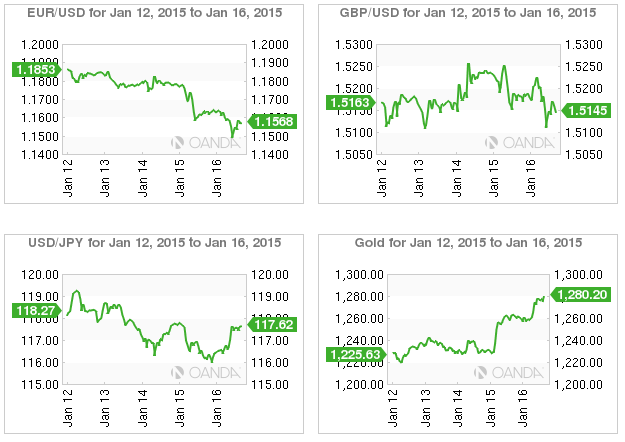- SNB removes 1.20 EUR/CHF cap and cuts deposits rates
- ECB expected to announced QE, devil will be in the details
- Danish National Bank’s exposure to EUR could be costly
Based on the number of scheduled events this week the market expected this week to a slow one. Enter the Swiss National Bank (SNB). Single-handedly the SNB managed to send shockwaves through global markets this week as it abandoned its €1.20 EUR/CHF line in the sand first implemented three-and-half years ago. It also lowered interest rates on deposits further, a deterrent to parking cash with the central bank. The about-face by the Swiss authorities managed to push gold prices to a five-month high ($1,263) as investors sought sanctuary in the yellow metal.
This late week aftershock will be felt for a long time, if not for months, just as market participants prepare themselves for next week’s onslaught of diarized event risks. Not surprisingly, central banks again take center stage: the Bank of Japan and Bank of Canada. But the main focus will be the ECB and the possible implementation of sovereign debt bond-buying or QE. For months, a large percentage of the FX market has been pricing in that eventuality for January 22.
Will the ECB Disappoint?
Will ECB chief Mario Draghi and his fellow cohorts manage to deliver what the market has been pricing in over the past few months in particular? Will QE be finally tabled? If so, will the ECB’s monetary plans and initiatives go far enough to address the eurozone’s growth and lower inflation concerns? If he disappoints the market, Draghi will lose a considerable amount of street credibility very quickly, much like the SNB’s Jordan.
Following the January 22 ECB meeting is a crucial Greek parliamentary election on January 25. The possibility and disruption of a “Grexit” (a Greek exit from the eurozone) is top of mind.
Investors should keep an eye on the Danish National Bank as it is the most exposed to an ECB policy change with its currency pegged to the EUR. Even the Swedish Riksbank cannot afford a rise in its own currency given recent consumer-price index headlines indicating domestic prices are barely rising, and like most central banks, it too has an inflation target of +2%. Nevertheless, an aggressive ECB will put further pressure on the Riksbank to ease further to alleviate some of the pressure on SEK from a safer-haven perspective (EUR/SEK €9.4566).
Next week in Europe
The Chinese fourth quarter growth data will accelerate the pace of releases on Monday. Forecasts are varied, but the market expects further slowdown from previous quarters as government action has been effective only in smoothing the rate of decline, but haven’t managed to reverse the trend. Commodities will be heavily linked to the final GDP figures as unsold inventories continue to accrue as demand shrinks.
How times have changed. After the crisis of 2008 central banks were commended for working in unison to avoid further global turmoil. After the United States’s Federal Reserve announced its plans to taper its bond-buying program it marked an end to the era of monetary policy coordination. Forward guidance entered the market’s everyday lexicon as central bankers could telegraph their intentions to boost economic growth. Compared to then, the new normal is based on unexpected or contradictory actions.
The Bank of Japan had a timely date for their market shock on October 31, 2014. Announcing an increase in its stimulus program, that while expected given the precarious state of the Japanese economy had been denied previously by governor Kuroda. The Swiss National Bank shook the market this week with an unexpected end to the CHF peg to the EUR at 1.20 that lasted three and a half years. That strategy proved ineffective and had the potential to be even costlier if allowed to carry over into next week, where the European Central Bank (ECB) is on line to announce a quantitative program to boost the Eurozone out of recession.
The ECB announcement next week will be the highlight on what already priced in to be a major week in trading. The ironic twist is the the SNB probably chose this week to release their shock decision because of the lack of noise from other central banks. The result was that without anything else going on the news was magnified and could have overshot the central bank’s intention. Mario Draghi will have the tough task of delivering on very high expectations from the market. The big question mark hangs not on QE, but on what type of QE will be announced as there is still deep divisions within the European Union on what should be done.

